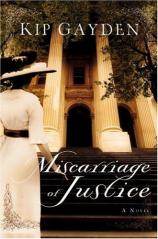Miscarriage of Justice
Review
Miscarriage of Justice
Kip Gayden is a man immersed in place. He attended law school at Vanderbilt University in Nashville, Tennessee, and now serves as a judge of the First Circuit Court of Nashville. He's also a writer who had a mind to produce a novel focusing on the sometimes-thorny question of justice under the law. He felt he'd hit pay dirt when he came upon some articles in the Nashville Tennessean from March 16, 1913. Headlines screamed out a shocking crime: a respectable local married woman shot her ex-lover in cold blood, in the light of day, in a public place with plenty of witnesses. The scandal would throw the Nashville area into a tailspin.
Juxtaposed with the bloody deeds surrounding the lives of the prominent and respectable citizenry were headlines regarding another major topic of the times: women's suffrage. Gayden perceived that, though there was no evidential link between the two points, there was a story --- a story about the ways that men and women were being forced to think about one another, and how the new sensibility that women might be equal to men could affect private lives down to their most intimate details.
Walter Dotson was a highly respected physician who returned to Tennessee by choice after a short globe-trot, with his new and attractive wife Anna. Both had relatives in the state and settled in to a proper middle-class existence in the small town of Gallatin, a few miles from Nashville. With two children and a house in the right sort of neighborhood, able to participate in civic life, and for Anna, in the clubs and social whirl suitable to a lady of her station, the Dotsons had it all. Until Charlie Cobb showed up.
Charlie was a handsome odd-job expert who suspected that the beautiful Anna was lonely behind the façade of her respectability. The two began exchanging passion-charged notes in the pages of magazines. It was heady stuff for Anna, whose husband was ideal in nearly every way, except in the bedroom. Gayden speculates that the good doctor had turned cold towards his hot-blooded wife, and Charlie was there to inflame her mind, then her body, supplying all the romance a woman could hope for. Indeed, by Anna's own testimony, she carried on an affair with Charlie, always meeting at her own home late at night in the yard or indoors when her husband was out of town as he frequently had to be. At times she did feel guilty, of course, but her excitement and desire outweighed her guilt. Only when word began to spread about the goings-on at the Dotsons’ house did she finally confess. At that point the outraged husband and the protective younger brother sprang into action, threatening to kill Charlie and making Anna understand the real extent of her perfidy.
The only friends she had left were the women in "the movement." Though their kindness may have been engendered by pity, at least they did not spurn her, and their own guiding principle that women should have equal rights with men in all things --- even in the sin of infidelity --- made it difficult for them to condemn her.
The socially superior Dr. Dotson ordered Charlie to disappear, only to learn that his scoffing rival had merely shifted from Gallatin to downtown Nashville. Tormented by the notion that her husband might indeed murder Charlie, bringing even worse havoc and humiliation to their children, Anna took it upon herself to meet Charlie in the barbershop where he was working and shot him four times. He died soon after. Anna was put on trial for premeditated murder. The only people with courage enough to support her openly were the yellow-sashed women of the movement, who carried signs outside the crowded courthouse reading "No right to vote, no right to sit on juries, no right to judge our own."
The verdict that emerged from this clash of ideologies would be called a "miscarriage of justice." Gayden offers his own view of how the events unfolded before, during and after the trial, building his case like a good attorney, fact by fact. The writer Gayden has gotten inside the minds and hearts of all the central characters; the legal expert Gayden has presented their cases fairly. The result is a spell-binding examination of the morality of the American middle class at a time when many cataclysmic social changes were afoot.
Reviewed by Barbara Bamberger Scott on January 7, 2011
Miscarriage of Justice
- Publication Date: February 12, 2008
- Genres: Fiction, Historical Fiction
- Hardcover: 336 pages
- Publisher: Center Street
- ISBN-10: 159995687X
- ISBN-13: 9781599956879










